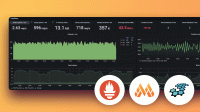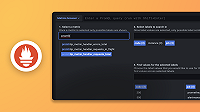discovery.gce
discovery.gce allows retrieving scrape targets from Google Compute Engine (GCE) instances.
The private IP address is used by default, but may be changed to the public IP address with relabeling.
Credentials are discovered by the Google Cloud SDK default client by looking in the following places, preferring the first location found:
- A JSON file specified by the
GOOGLE_APPLICATION_CREDENTIALSenvironment variable. - A JSON file in the well-known path
$HOME/.config/gcloud/application_default_credentials.json. - Fetched from the GCE metadata server.
If Alloy is running within GCE, the service account associated with the instance it’s running on should have at least read-only permissions to the compute resources. If running outside of GCE make sure to create an appropriate service account and place the credential file in one of the expected locations.
Usage
discovery.gce "LABEL" {
project = PROJECT_NAME
zone = ZONE_NAME
}Arguments
The following arguments are supported:
| Name | Type | Description | Default | Required |
|---|---|---|---|---|
project | string | The GCP Project. | yes | |
zone | string | The zone of the scrape targets. | yes | |
filter | string | Filter can be used optionally to filter the instance list by other criteria. | no | |
refresh_interval | duration | Refresh interval to re-read the instance list. | "60s" | no |
port | int | The port to scrape metrics from. If using the public IP address, this must instead be specified in the relabeling rule. | 80 | no |
tag_separator | string | The tag separator is used to separate the tags on concatenation. | "," | no |
For more information on the syntax of the filter argument, refer to Google’s filter documentation for Method: instances.list.
Exported fields
The following fields are exported and can be referenced by other components:
| Name | Type | Description |
|---|---|---|
targets | list(map(string)) | The set of discovered GCE targets. |
Each target includes the following labels:
__meta_gce_instance_id: the numeric id of the instance__meta_gce_instance_name: the name of the instance__meta_gce_label_LABEL_NAME: each GCE label of the instance__meta_gce_machine_type: full or partial URL of the machine type of the instance__meta_gce_metadata_NAME: each metadata item of the instance__meta_gce_network: the network URL of the instance__meta_gce_private_ip: the private IP address of the instance__meta_gce_interface_ipv4_NAME: IPv4 address of each named interface__meta_gce_project: the GCP project in which the instance is running__meta_gce_public_ip: the public IP address of the instance, if present__meta_gce_subnetwork: the subnetwork URL of the instance__meta_gce_tags: comma separated list of instance tags__meta_gce_zone: the GCE zone URL in which the instance is running
Component health
discovery.gce is only reported as unhealthy when given an invalid configuration.
In those cases, exported fields retain their last healthy values.
Debug information
discovery.gce does not expose any component-specific debug information.
Debug metrics
discovery.gce does not expose any component-specific debug metrics.
Example
discovery.gce "gce" {
project = "alloy"
zone = "us-east1-a"
}
prometheus.scrape "demo" {
targets = discovery.gce.gce.targets
forward_to = [prometheus.remote_write.demo.receiver]
}
prometheus.remote_write "demo" {
endpoint {
url = PROMETHEUS_REMOTE_WRITE_URL
basic_auth {
username = USERNAME
password = PASSWORD
}
}
}Replace the following:
PROMETHEUS_REMOTE_WRITE_URL: The URL of the Prometheus remote_write-compatible server to send metrics to.USERNAME: The username to use for authentication to the remote_write API.PASSWORD: The password to use for authentication to the remote_write API.
Compatible components
discovery.gce has exports that can be consumed by the following components:
- Components that consume Targets
Note
Connecting some components may not be sensible or components may require further configuration to make the connection work correctly. Refer to the linked documentation for more details.



